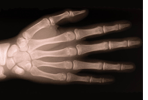Diagnostics
Canadian company wins competition at RSNA
February 21, 2018

TORONTO – Physicians Alexander Bilbily and Mark Cicero spent years training to be radiologists. But the two believe their biggest impact will be outside their medical offices. Bilbily and Cicero are founders of 16 Bit, a Toronto-based startup that intends to reinvent radiology with GPU-accelerated Deep Learning.
The 18-month-old company recently took a big step in that direction by beating about 50 teams to win the Radiology Society of North America (RSNA) pediatric bone age competition. The contest, designed to show how AI could be applied to medical imaging, challenged competitors to modernize the decades-old test now used to assess children’s growth.
“We thought as a young startup we had something to prove,” Cicero said.
Bone age is just the beginning for 16 Bit. It’s also taking aim at using AI to advance mammograms and CT scans.
When a child is growing too quickly or slowly, doctors take X-rays of the child’s hand to measure skeletal maturity. Despite dramatic advances in digital imaging, radiologists still judge growth by comparing the X-ray images to pictures in a textbook published nearly 60 years ago.
16 Bit’s winning algorithm automates that process, achieving an accuracy rate that topped a panel of pediatric radiologists. The company used some 10,000 hand X-rays and several NVidia GPUs, including the Titan Xp, to teach a neural network to assess bone age.
The company describes its solution in detail on its blog, and also has an online demo that lets you try it out on your own images. 16 Bit, a member of NVidia’s Inception AI startup accelerator program, plans to make its algorithm freely available to hundreds of U.S. hospitals.
“Our hope is that our company affects more lives in the next few years than we’d could have in our entire lifetimes as practicing radiologists,” Bilbily said.
16 Bit is also using NVIDIA GPUs and Deep Learning to tackle two other medical tests it sees as ripe for reinvention – mammograms and CT scans of the head.
Mammograms are the standard screening for breast cancer, the second leading cause of cancer death among women. But they are far from precise. The tests miss one in five cancers, according to the U.S. National Cancer Institute. Or they may indicate cancer when it’s not there – a false positive – forcing women to endure anxiety and needless procedures like biopsies or ultrasound tests.
“Breast cancer is both common and potentially deadly,” said Bilbily. “We see a dramatic opportunity for AI to impact this field.”
The company is conducting clinical studies on its cancer-detecting software, and it recently obtained 400,000 mammograms to help improve its algorithm.
AI in the Emergency Room
CT scans are a common emergency room test when doctors suspect stroke, a brain hemorrhage, an aneurysm or other neurological problem. These conditions must be treated quickly to avoid brain damage or even death.
Trouble is, there’s typically a delay between the CT scan and the radiologist’s report, Bilbily said.
“A hospital might perform 30 CT scans of the head overnight and these scans may not be interpreted by a radiologist until the morning,” Cicero said.
16 Bit’s AI software flags CT scans that might contain a serious neurological finding, so radiologists can prioritize interpreting those first.
16 Bit is one of more than 2,200 startups in our Inception program. The virtual accelerator program provides startups with access to technology, expertise and marketing support.
To learn more about how AI is transforming healthcare, come to the GPU Technology Conference, March 26-29, in Silicon Valley.
